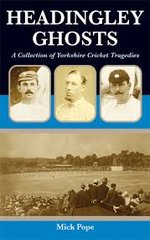Headingley Ghosts
Martin Chandler |Published: 2013
Pages: 256
Author: Pope, Mick
Publisher: Scratching Shed Publishing
Rating: 4 stars

Major publishers no longer seem to be interested in the literature of cricket. It was not always so, but in recent years almost all of the best writing on the game has emerged from small independent publishers.
Scratching Shed Publishing Limited are certainly a new one on me. The very name conjures up thoughts of Leeds United FC, not something to endear them to many neutrals, and a bit of research on the internet informs me that the company was founded with a view to publishing books about Rugby League, and its back catalogue demonstrates that there have been a goodly number of those.
More recently the company have expanded their repertoire in a number of areas and currently there is a single title that appears when you click on the “cricket” button on the website. Headingley Ghost has been out a few weeks now, yet its release seems to have received little attention outside the Broad Acres, which is a great shame, as it is a gem of a book, that crosses several genres of cricket writing.
The sub-title of the book is A Collection of Yorkshire Cricket Tragedies, which immediately gives a flavour of what it is about. As journalists and authors know only too well public interest in the misfortune of others has long been a way to shift copies of newspapers, magazines and books. While followers of a sport whose contests can last five days, and contain all the intricacies of a game of chess, would probably like to thing themselves above that sort of thing, the truth is we are not, as anyone who has tried to source copies of David Frith’s two books about cricketing suicides, Silence of the Heart and By His Own Hand, will know only too well.
Mick Pope knows his subject as well as anyone. He has already written accounts of the lives of two of the Test players featured here, Major Booth and Roy Kilner, and has contributed to other books about Yorkshire cricket.
I had expected the book to consist of a series of free-standing essays each based on individual, but that is not what I found, rather Pope has started with a series of chapter headings gathering together cases with common features and, all told, there are more than 60 case studies of varying length. The preface deals largely with the case of David Bairstow, and it is a very nice piece of writing, marred by a bit of a howler when former Derbyshire, Northamptonshire and England player David Steele is described as being an off spinner (whenever I saw him bowl it was orthodox slow left arm). Appearing as soon in the book as it did such a mistake worried me, but I didn’t spot another one, so am happy that was a one-off.
Inevitably many of the case studies are from the distant past, two thirds of them being from before the Great War, and almost half from the 19th century. In fact only half a dozen post-date the return of peace in 1946, and poor Bluey is the only man from the last thirty years who figures in the book.
Many of the tragedies would not have happened today, some of them occurring because of accidents quite shocking to younger readers who have been brought up in today’s Health and Safety conscious world. Medical science would now have avoided some of the examples here, young men so rarely now dying of pneumonia, and better treatment being available for all maladies that afflict mankind.
Surprising too is the social history, and the poverty into which so many former professional cricketers fell once they could no longer ply their trade on the field. The Yorkshire Club did, to be fair, grant assistance, but rarely soon enough, and never as a matter of course. In this respect the book dovetails rather well with the ground-breaking Talks with Old Yorkshire Cricketers written by Old Ebor (AW Pullin) back in 1898, and reviewed by Archie here, just 108 years after the event.
If there is an area that is not dealt with as fully as might be expected it is the chapter entitled “On Foreign Fields”. There is a great deal on the sad case of Major Booth, who died on the Somme, as well as casualties of the Boer and Spanish Civil Wars, but nothing at all about Hedley Verity, who died in Italy in 1943 as a result of wounds sustained during the allied invasion of Sicily – but then Verity’s story is widely known, and a full biography has been published, and that is why he was omitted. In any event Pope is at pains to point out that the book is not intended to be comprehensive.
Notwithstanding that it was an area in which he already had considerable knowledge Mick Pope must have spent many long hours researching this book, and he has made a very good job of writing it and tying together a number of disparate stories. Headingley Ghosts is certainly a title I would recommend, and I hope it sells well.






Leave a comment